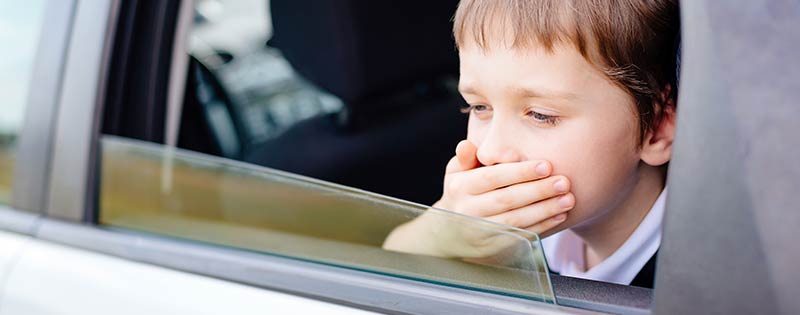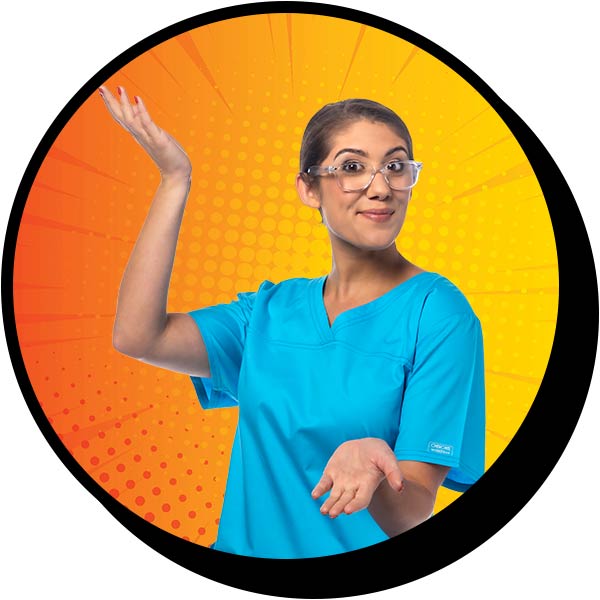by Brent Hearn •
With the holly-jolly season in full swing, many of us are looking forward to holiday meals, gift exchanges, time off from work, and traveling to spend time with family. Whether by plane, train, or automobile, holiday travel can mean something decidedly less pleasant for some of us: motion sickness. (We’ll focus on automotive travel; motion sickness is an expansive topic.)
There’s nothing like cold sweats and nausea during hour two of a seven-hour car ride to put a damper on that family sing-along. That said, a propensity for motion sickness is not a death knell for you or your family’s enjoyment during the holidays. With a little bit of planning, there’s a lot you can do to head it off at the pass.
Snack Smart
It’s important to watch what you put into your stomach both before and during your trip. Traveling on an empty stomach can increase the chances of motion sickness, so shoot for eating something light 45 to 60 minutes before your departure. The catch? It needs to be bland. (Think crackers, turkey, peanut butter, etc.) Heavy, spicy, greasy, and/or acidic foods are a recipe for gastrointestinal distress during travel, so steer clear of anything that fits the bill both before you leave and during your trip. Sure, those convenience store junk food runs are fun, but are they really worth the potential consequences?
Staying hydrated while traveling can help too. Yes, it’ll tack on some extra time to your trip if you’re traveling by car, but it’s a small price to pay. Stopping to relieve yourself beats stopping to clean up the results of carsickness any day.
Nix the Electronics
There can be a disconnect between what our inner ear perceives and what our other senses are telling us when our bodies are in motion. In short, even if passengers are distracted by an episode of their favorite shows or the latest dance taking TikTok by storm, their bodies still “know” they’re moving. (It had better be the passengers who are distracted; it should go without saying that you shouldn’t be playing games and watching movies while you’re driving!)
This disconnect can cause motion sickness, especially for children. (Many of us become at least partially desensitized to the phenomenon as we get older.) Though it’s sure to cause some grumbling, it may help to put the kibosh on the devices until you arrive at your destination. Replacing the tech with travel games—think oldies-but-goodies like “I Spy”—is one way to distract kids from the loss of their favorite brain-melter, and it has an additional benefit: looking out the window can further decrease the disconnect between what the eyes see and what the body feels.
Seating Arrangements
The seating options for younger children are obviously limited for safety reasons (and, by extension, the law). Adults susceptible to motion sickness should sit in the front passenger seat when possible. Share the driving duties when there’s more than one adult in the car.
Medications
Sometimes, you’ve just got to hit the pharmacy. Over-the-counter antihistamines such as Dramamine have been proven to be effective against motion sickness. (They can cause drowsiness, however, so caution is warranted.) Another option is to use Scopolamine patches, but you’ll need a prescription from a doctor.
Other Remedies
Many claim that ginger can help to prevent or reduce nausea, and its efficacy has been backed by numerous studies. Wristbands touted to help relieve motion sickness have a more dubious reputation, but again, some swear by them. (If it’s not harmful or expensive and nothing else works, hey…who cares if it’s a placebo effect if it seems to help, right?)
With a little planning and preparation (and perhaps a bit of trial and error), motion sickness during travel doesn’t have to be a foregone conclusion. Here’s to finding what works for you—and to finding a travel playlist the whole family can agree on!
Sources:
https://www.nytimes.com/article/kids-carsick.html
https://my.clevelandclinic.org/health/articles/12782-motion-sickness
https://www.mentalfloss.com/article/78131/9-scientifically-proven-ways-prevent-motion-sickness
https://www.mcgill.ca/oss/article/critical-thinking-health-technology/can-you-turn-nausea-wrist









 ▶︎
▶︎  Why is the Discount Challenge prize amount $15,024? Because that is the average “per-occurrence” fine for Medicare inducements. That’s not $15,024 per patient, that’s not per provider, that’s PER VISIT. Stinks, doesn’t it? To us, the prize amount is worth the investment if we can help our profession better understand proper discounting.
Why is the Discount Challenge prize amount $15,024? Because that is the average “per-occurrence” fine for Medicare inducements. That’s not $15,024 per patient, that’s not per provider, that’s PER VISIT. Stinks, doesn’t it? To us, the prize amount is worth the investment if we can help our profession better understand proper discounting.